How the National Union of Journalists of Ukraine (NUJU), with the support of foreign financial donors, manages to help affected media workers
After, overnight into December 22, 2023, a russian Shahed UAV hit a Kyiv apartment building where the family of ICTV journalist Andrii Kovalskyi lived and destroyed his apartment; the family had to move to their friends.
Every time an air raid alert goes off, Andrii, his wife, and children run for cover.
“There is an almost panicky feeling,” the journalist admits. “Even when we understand that missiles or Shaheds are not flying toward Kyiv… Psychologists work with children…”
Journalists living in Ukraine are exposed to danger not only when working near the front line but also at home. The NUJU, through its network of Journalists’ Solidarity Centers, promptly responds to the urgent needs of colleagues as a result of the russian attacks and provides small grants that become the primary support in times of need. Since December 2023, thanks to donations from the Danish Association of Journalists, the journalists’ union has been supporting colleagues who were injured, evacuated from the territories of Ukraine temporarily occupied by russia and lost their homes.
“Someone’s life is broken, but I have only a broken leg,” said a journalist from Kharkiv.
Anna Miyasnykova, a journalist at the Nakypilo media group, received a serious leg injury during a missile attack on Kharkiv on the evening of January 23, 2024.
Anna was returning home from work when she witnessed a missile attack.
“I saw a flash and a very loud sound, and as in slow motion, soot covers me, I feel that my leg hurts. She still didn’t know what was wrong with her. I see glass slowly falling from the windows next to me, and I was lucky; I was on the corner of the building; if I had been a little further, all the windows from five floors would have fallen on me,” recalls Anna.
After being injured (shrapnel damaged her foot, pierced a bone, and got stuck in it), the journalist limped to the shelter. On the way, she was even able to report to the newsroom what had happened to her. At that moment, a second explosion rang out, cutting off the connection…
“I called the ambulance, but I couldn’t be heard,” the journalist said later. “The connection is interrupted, and the blood flows…”
However, Anna survived. In addition, having pre-medical self-help skills and a first-aid kit, she bandaged the wound and stopped the bleeding. Soon, Anna was found by a colleague who was on duty in the newsroom – he called an ambulance. Anna was operated on in the regional hospital; her condition is stable.
“When you see how your blood flows when you feel how wet and thick it is, and you rub it in your fingers – this is a feeling that will stay with me,” says Anna. “I am uncomfortable that there is much more grief, and here there is so much attention to me. In Kharkiv, a few hours before my injury, a child and his mother died under the rubble of a house due to shelling, and I only had a fracture… And everyone asks me how I am. Someone has a broken life, and I have only a broken leg…”
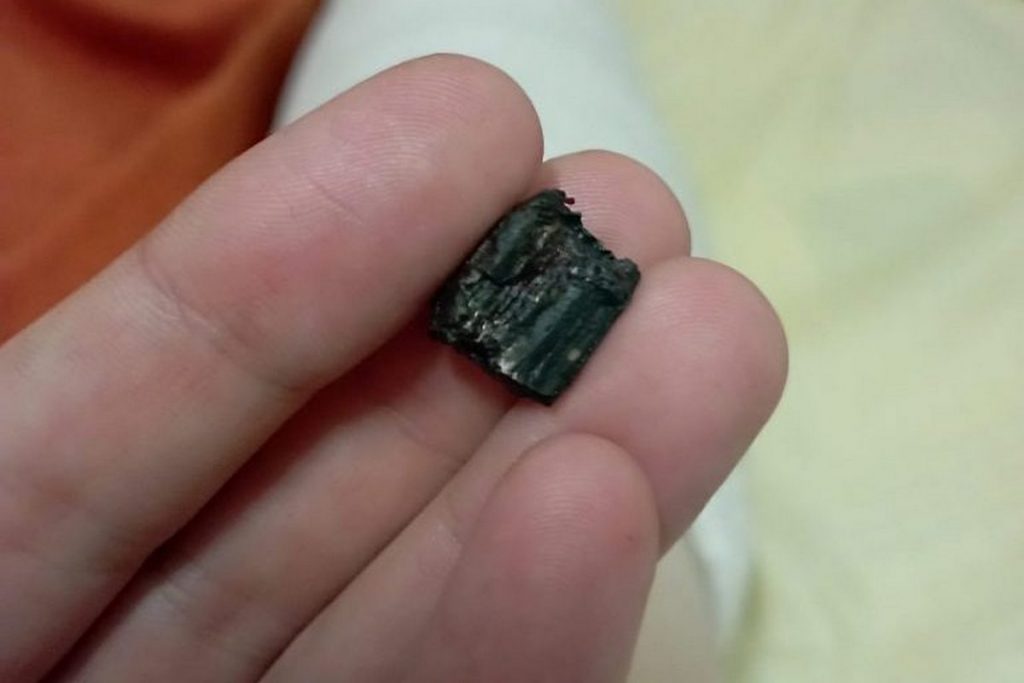
“The side on which I fell is not damaged, but the one above is cut by shrapnel,” a journalist from Zaporizhzhia
On April 5, 2024, Olha Zvonariyova, a correspondent at the Ukrinform Ukrainian national information agency, came under enemy fire in Zaporizhzhia.
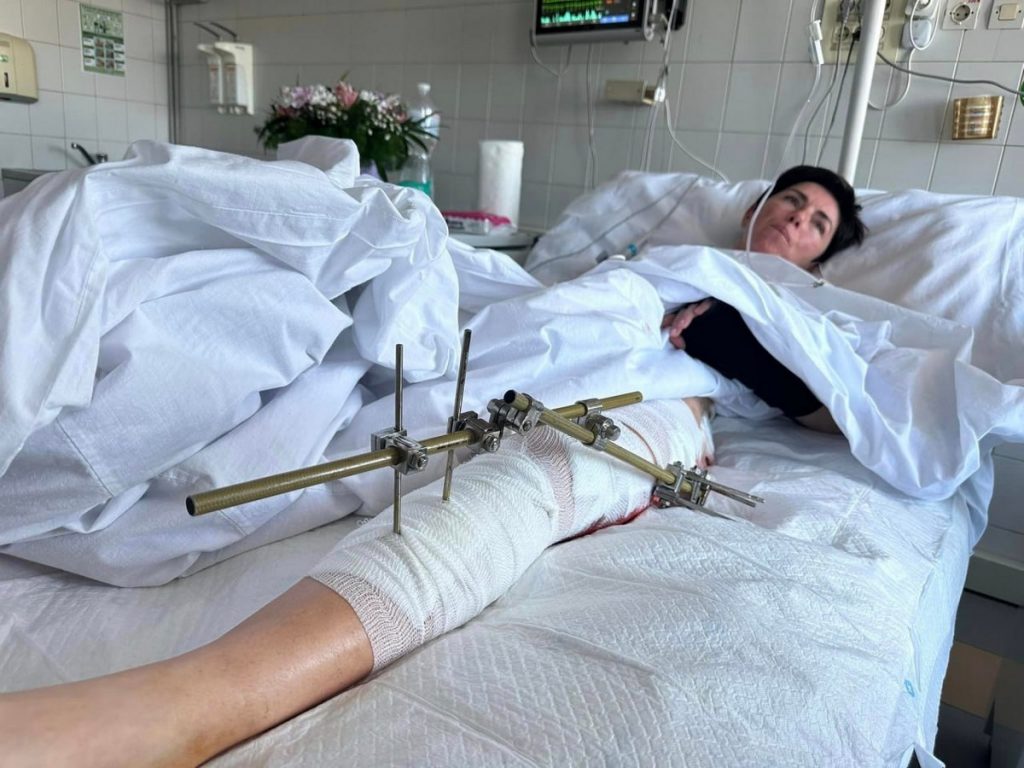
The journalist has a damaged thigh, which many pieces of debris got into, her stomach (a small piece of debris stuck there, but the doctors decided not to remove it), and a fractured wrist.
Olha recalls that after the first three missile attacks on Zaporizhzhia, she and her colleagues worked on the spot: the emergency services and the police converged there. Soon, everyone heard the fourth missile and started running.
“But it flew so quickly that I fell near the car that was standing nearby. She fell on her side. The side on which she was lying is undamaged, and the top is cut,” she added. “The glass in the car was broken, gasoline was leaking. I am very grateful to my colleagues and medics who were at the scene of the incident and very quickly got their bearings – applied tourniquets, called an ambulance for me, and another colleague who was also injured. Thanks to such actions, deaths at that moment were avoided.”
The journalist maintains an optimistic mood. “A lot of work. When the bones grow back into battle!” she says.
“I felt blood running down my face,” said a journalist from the 1+1 TV channel.
The journalist of the 1+1 TSN TV channel Kira Oves, who received a cut wound to the head during the same explosion as Olha Zvonariyova, says that at the moment “everything plus or minus is fine” with her.
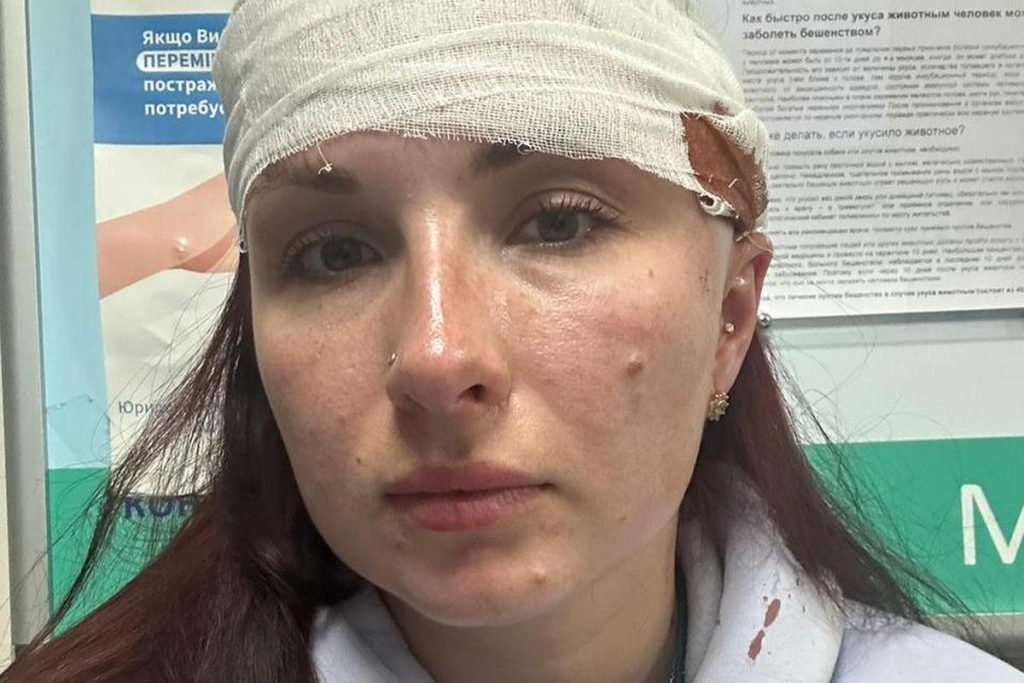
Kira says that she worked near the place of the previous missile hit. By that time, two hours had already passed.
“We recorded the damage and interviewed people. Suddenly, we hear a whistling sound overhead – and an immediate explosion. I didn’t feel the wound; I just felt the blood running down my face. We ran to find a place to hide as one more hit could take place there. I can say that I was still lucky – my colleague Olha Zvonariyova was more affected. Fortunately, our equipment was not damaged,” adds Kira Oves.
The NUJU provided emergency financial assistance to the colleague.
“The fire was extinguished, but everything was destroyed:” families of journalists were left without a home.
On January 2, 2024, due to a russian attack, the family of Kyiv TV presenters Olena and Viktor Sinkevyches lost everything they had – an apartment, a car, and all their belongings. Olena and Viktor only managed to grab the documents and miraculously survived. The journalistic community of Ukraine organized a collection of funds to support injured colleagues; the NUJU provided substantial monetary assistance.
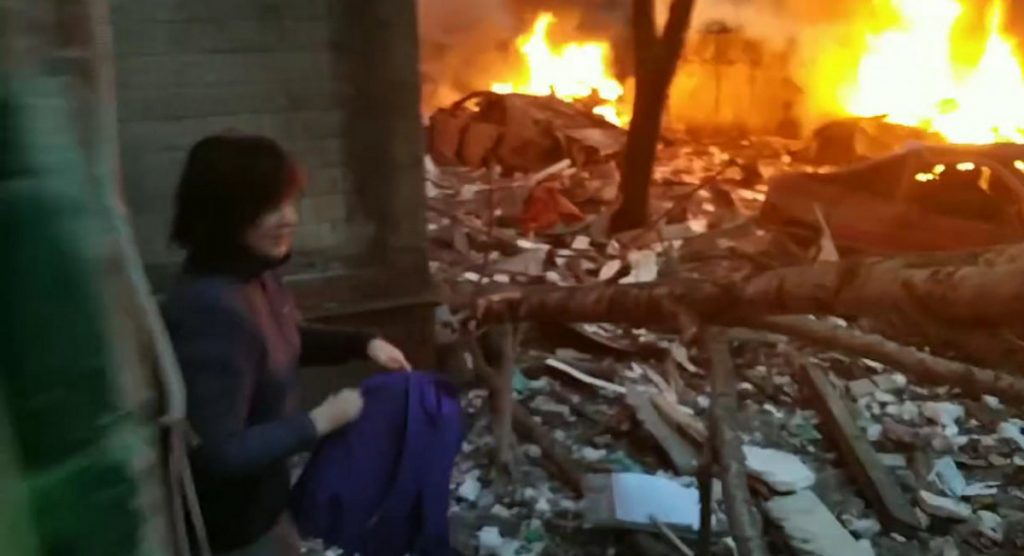
We also supported the family of a TV journalist, Andrii Kovalskyi, who, according to his wife Tetiana Khytryk, “survived in hell.” A russian drone flew directly into their apartment, and the woman only had time to run into the children’s room and close the children with her body. When the drone exploded, everything around caught fire, and while Andrii was carrying the children, Tetiana grabbed a fire extinguisher and started putting out the fire.
“I thank fate that I survived the very hell… that I did not burn alive under the rubble, that I was able to put out the flames, that I was able to…,” says Tetiana.
The family would like to thank friends and relatives who helped with housing, supported them in a difficult hour, and did not stand aside.
“Literally when it happened, about half an hour later, people started writing – they know where we live and saw that hit. My friends ran to me. And journalist friends – probably all of them – wrote us words of support, and many of them supported us financially. It is very nice that the Union of Journalists of Ukraine responded and came to help. I am very grateful to everyone because it was unexpectedly pleasant that people are not indifferent to other people’s troubles,” says Andrii Kovalskyi.
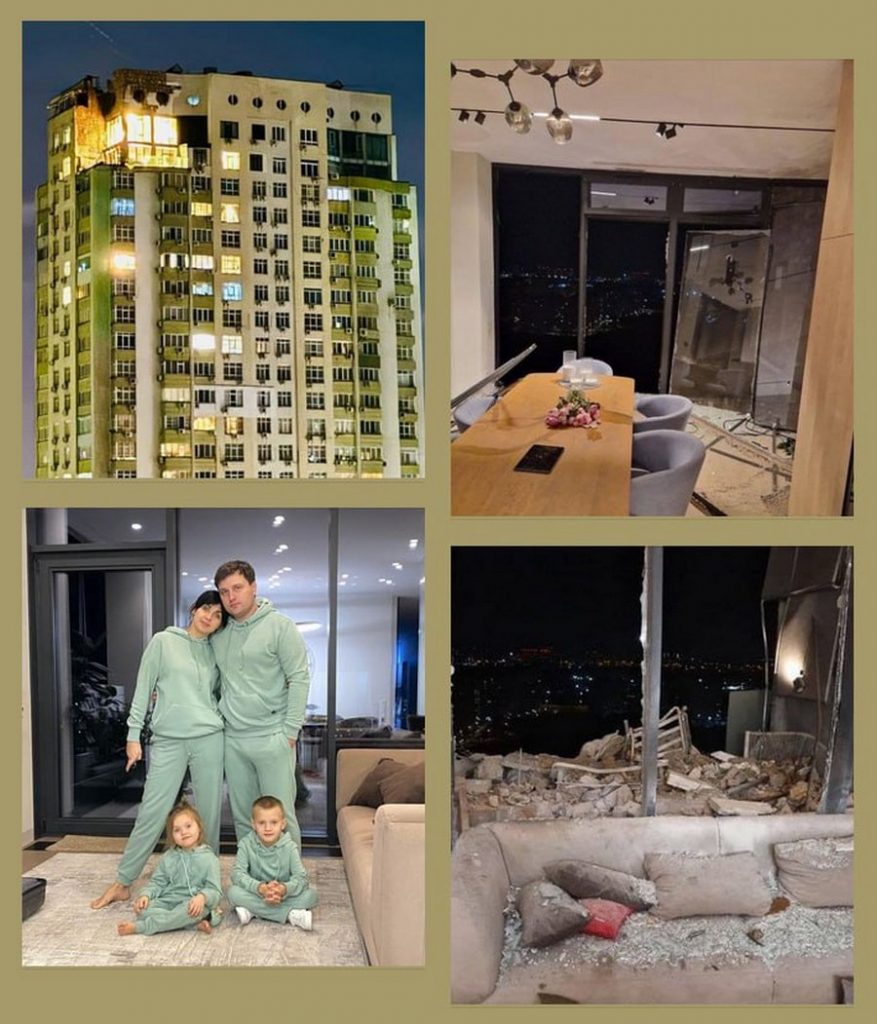
“Shards shattered glass and damaged walls:” russian strikes damaged the residences of journalists’ families.
Kherson-based journalist Lidiya Hryhoriieva, who had to leave her hometown and move to Kyiv due to the war, was left homeless for the second time: the war caught up with her in the capital again.
On January 2, 2024, an enemy missile hit the building where Lidiya rented an apartment, and the windows in the apartment were shattered. In the January frost, the residents themselves, with the help of friends from Kyiv, covered the windows with chipboard plates, but the windowless apartment turned from a cozy home into a cold house.
“I live with two children. The landlords, for their own reasons, cannot reinstall windows quickly, so I had to move again. In Kherson, our apartment was also badly damaged… But fortunately, on January 10, we moved into a two-room apartment provided to us by the Hansen Foundation. At least we warmed up. Moving entails extra expenses in buying things that are necessary for daily life, so the small financial support from the NUJU was prompt and timely. I am grateful to the Union for its support,” says Lidiya Hryhoriieva.
She adds that from the first days of the full-scale war, while still under occupation, the newsroom of the Ukrayinskyi Pivden news publication, where Lidiya worked, felt that there were those nearby who would give wise advice and help financially.
“The main thing is the feeling that you are not alone with your problems, that someone does not care what is happening to you now,” says the journalist.
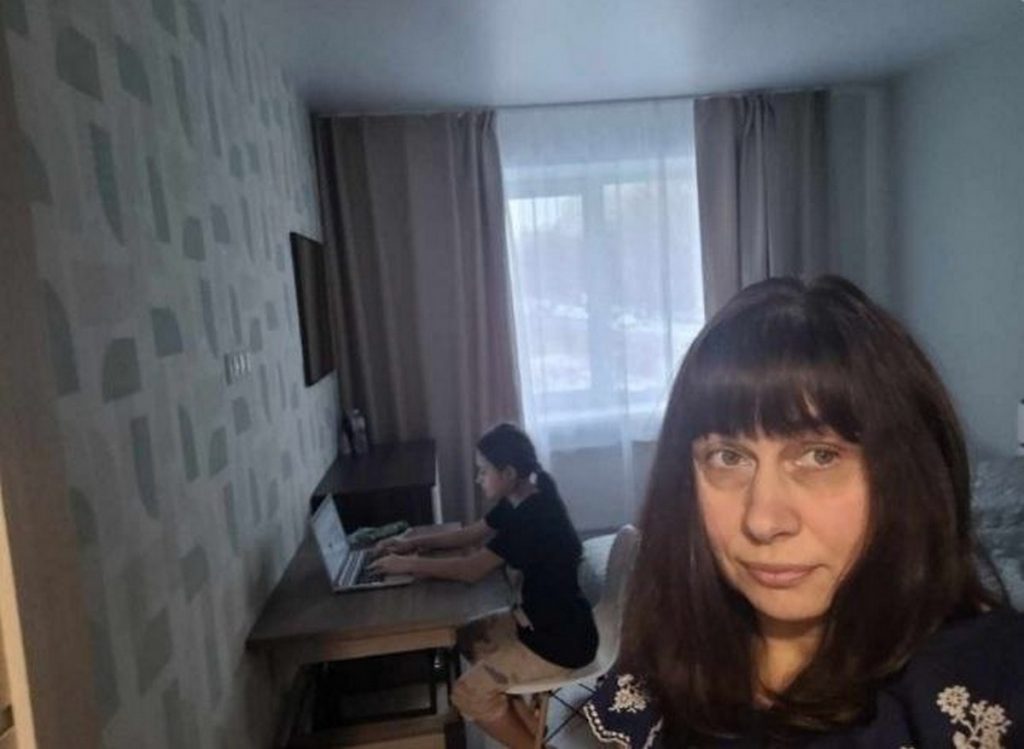
Kharkiv became one of the cities of Ukraine most affected by russian missile and drone attacks. Among the townspeople whose homes were destroyed, there is a journalist couple, Oleksandr Manchenko, correspondent of the Slobidskyi Krai publication, and Valeriya Yemets, a journalist from Suspilne.
“On December 31 at 12:58 a.m., a Shahed hit the site opposite our house,” Oleksandr Manchenko told NUJU. “I even saw the blow itself. As a result of the explosion in our apartment, fragments shattered the glass in two windows and damaged the walls. The blast wave knocked out the frames of all the windows (they stand, do not fall out, but shake quite a lot). In the bathroom, due to the explosion, a hanging cabinet fell and damaged the sanitary ware…”

On January 17, 2024, as a result of a nighttime drone attack on Odesa, the residence of journalist Nazar Melnikov was damaged.
“The ceiling collapsed due to the blast wave,” the media person said on the social network. “Fortunately, everything is fine with me and my cats…”
The journalist was not injured because he was not at home at the time of the impact.
On the night of January 29, due to a missile attack by the occupiers on the Dnipro District, the detached house of a well-known photojournalist, Viktor Hrabovskyi, was severely damaged. Debris of a downed russian missile fell on the territory of a summer cooperative, where at one time, many journalists received plots.
“When it happened, I got a call from a neighbor in the country. Her house was destroyed, but she was saved by the fact that before the shelling, the dogs behaved very restlessly, and she took them for a walk. My first impression of what I saw was horror! All that took so much effort, work, and care has been destroyed,” says Viktor Hrabovskyi.
As a result of a missile attack on Kyiv on March 21, 2024, the residence of Mykola Shkaraban, the head of the broadcasting network development and licensing department of the DIM TV channel, was seriously damaged.
“When it hit, we were already awake. The daughter and the wife managed to jump out into the hallway. I didn’t have time and saw through the window how this orange-red horror was approaching. And glass flew at me… But fortunately, it didn’t touch me. Later, when the rescuers came to put out the fire in the house opposite, I went to lie down for a while because I had a certain illness. I got into bed and felt that it was full of broken glass… But, you know, no cut!” wonders Mykola Shkaraban, who is used to looking for the positive in every situation…
Viktor Artemenko, a journalist from Nikopol, had two hits in a month. On March 26, half of the roof collapsed in his house. The NUJU helped restore the building. But on April 24, russian ammunition hit him for the second time. Now, everything here is damaged: the roof has been breached, the ceiling has collapsed, the walls have been destroyed, and the windows have been broken.
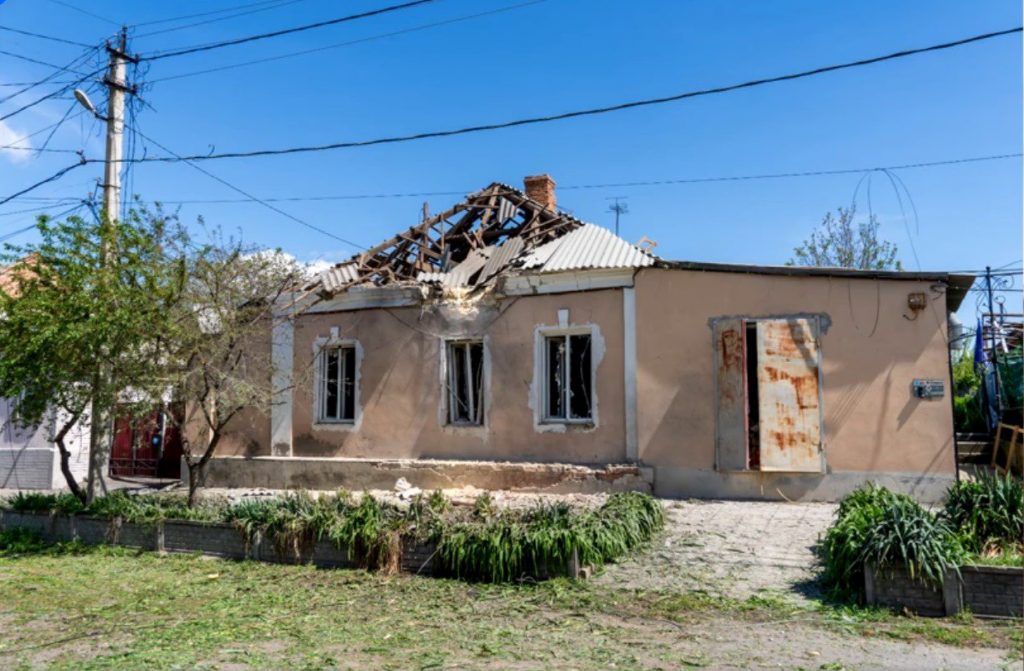
Odesa houses also often suffer from russian attacks.
“Shahed hit right in the middle of our yard,” Larysa Kuzora, the editor-in-chief of MC.today special projects from Odesa, told NUJU. In the journalist’s apartment, the entrance door and hallway were destroyed, and other rooms were also damaged: the windows were broken, and the ceiling collapsed.
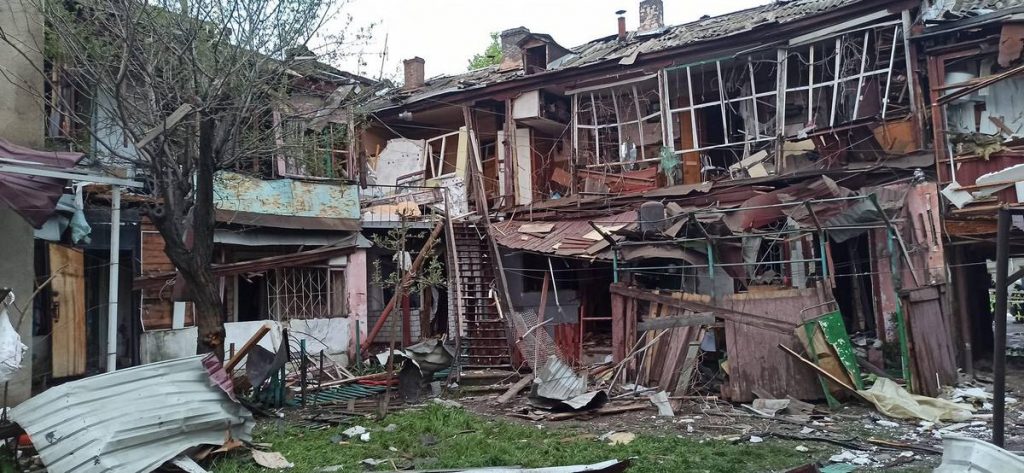
“There was a large funnel left in the yard: here at 2:30 overnight into April 23, 2024, when the explosions in Odesa seemed to have already died down, a belated russian Shahed flew in,” Larysa says. “Two cars exploded, and a fire started. Absolutely all apartments were affected, including the apartment where my mother lives and where I am registered.”
Fortunately, the journalist’s mother herself went downstairs to the neighbors when the shelling began. Valentyna Kostiantynivna was hit by an explosive wave, and a neighbor suffered a broken limb, but luckily everyone survived. But the neighbor’s apartment was less damaged, so it is not known what would have happened if the woman had stayed at her place.
The NUJU provided emergency financial assistance to all colleagues whose homes were damaged by russian attacks.
“Forced to live far from home…:” two media workers were recently evacuated from the occupied territories.
Fleeing the war and the intimidation and pressure of the russian occupiers, hundreds of Ukrainian media workers had to leave their homes. Moving and setting up in a new place requires significant financial costs. Thanks to the help of the NUJU and its partners, this burden can be eased. Only in December 2023 the union helped two displaced journalists from the temporarily occupied territories.
One journalist left the occupied Kherson Region. For security reasons, we cannot reveal the last name. Thanks to connections in media organizations in different countries and with the support of foreign financial donors, the NUJU helped colleagues in the evacuation.
Another journalist managed to leave the occupied part of the Zaporizhzhia Region with the help of the NUJU.
“A colleague was able to evacuate from Melitopol through the territory of russia to one of the Baltic countries. The experience made him sick – the doctors diagnosed a stroke,” says Nataliya Kuzmenko, the head of the Zaporizhzhia regional organization of the NUJU. “Thanks to the partners of the union, it was possible to help this man with funds for treatment and rehabilitation.”
The NUJU is trying to provide emergency financial assistance to colleagues who suffered as a result of russian aggression as quickly as possible.
“When it becomes known about another russian shelling, we immediately contact our colleagues in the city that was the victim of the attack to find out if there are any victims among them,” says Nataliya Nazarova, the coordinator of the Journalists’ Solidarity Center, who administers the provision of emergency aid. “After learning that a colleague has been injured or his property destroyed, we contact him or her, offer to fill out the form via the link on the NUJU website, and send copies of the documents required for accounting. We verify the identity of the applicant, make a submission to the central office of the union – and the person soon receives funds on his bank card.”
Security of media workers in war conditions, provision of emergency assistance to Ukrainian journalists, and attraction of funds from international donors for the Ukrainian media sector are constantly discussed by the NUJU leaders while visiting the headquarters of international institutions.
“We are sincerely grateful to each of our partners – influential international organizations, national journalist unions, and other donors who express full solidarity with Ukrainian journalists,” says NUJU President Sergiy Tomilenko. “It is precisely thanks to the powerful support of our partners in Ukraine that the network of Journalists’ Solidarity Centers works effectively. This “hotline” has helped thousands of journalists since April 2022 and continues to this day to support colleagues. And since winter, our emergency fund has been operating effectively thanks to contributions from the Danish Association of Journalists. We are sincerely grateful to its president, Tine Johansen, and member of the executive committee of the European Federation of Journalists from Denmark, Allan Boye Thulstrup.
NUJU Information Service

 THE NATIONAL UNION OF
JOURNALISTS OF UKRAINE
THE NATIONAL UNION OF
JOURNALISTS OF UKRAINE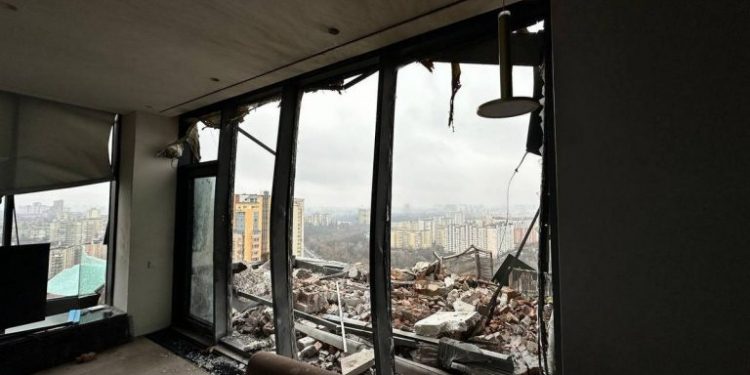
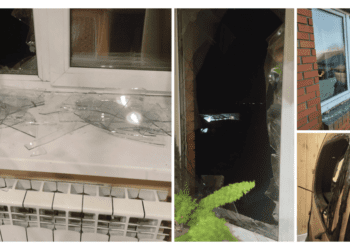
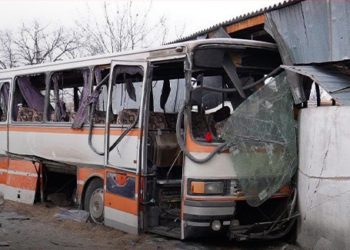
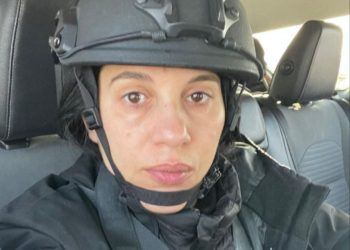













Discussion about this post